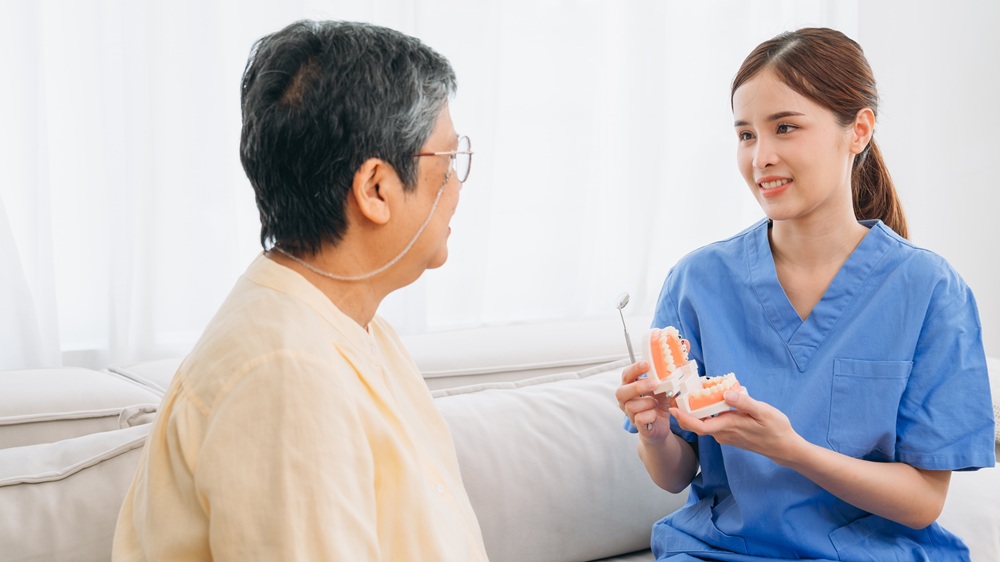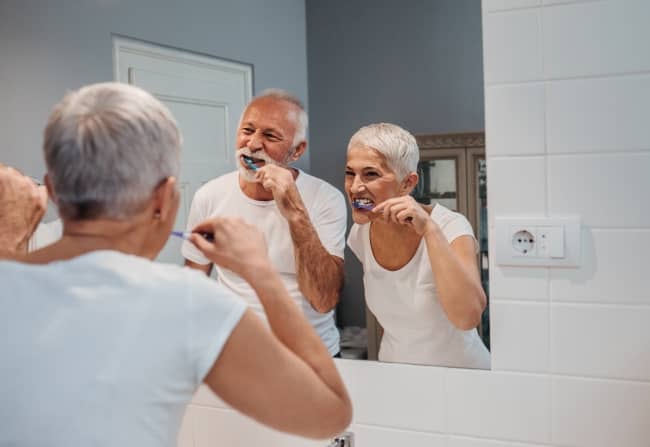The Importance of Oral Hygiene in Nursing Homes
Oral hygiene is essential in nursing homes, as it plays a direct role in residents’ overall health, comfort, and dignity. Poor oral health can lead to difficulties eating, painful infections, and even serious medical conditions such as pneumonia. Despite this, oral care is often overlooked in aged care settings, leaving many residents at risk of unnecessary pain and health complications. Ensuring good oral hygiene in nursing homes not only improves residents’ quality of life but also supports better overall care outcomes.
At Aged Care Dentistry, we specialise in providing gentle, high-quality dental care for elderly patients, particularly those living in residential aged care. With over a decade of experience in mobile dentistry, we understand the unique challenges that come with maintaining oral health in nursing homes. Our team is dedicated to delivering expert care that is accessible, compassionate, and tailored to the needs of aged care residents.
In this guide, we’ll explore why oral hygiene is so important in nursing homes, the risks of neglect, and how aged care providers can implement effective oral health practices.

Why Oral Hygiene in Nursing Homes Matters
Oral hygiene is about more than just maintaining a clean and healthy mouth—it has a direct impact on an individual’s overall health, comfort, and quality of life. For nursing home residents, many of whom have complex medical conditions or mobility limitations, good oral care is essential for preventing serious health issues. Unfortunately, poor oral hygiene is a common problem in aged care settings, often leading to avoidable pain, discomfort, and infections.
The Immediate Health Risks of Poor Oral Hygiene
Neglecting oral hygiene can quickly lead to a range of health problems, including:
- Malnutrition and Dehydration: Many elderly residents struggle with chewing and swallowing due to untreated dental issues, leading to poor nutrition and weight loss. A sore mouth or ill-fitting dentures can make eating painful, causing residents to avoid food and drink.
- Infections and Gum Disease: Without regular oral care, bacteria can build up in the mouth, leading to gum disease, tooth decay, and oral infections. These conditions cause pain and can make daily activities, such as talking and eating, uncomfortable.
- Chronic Pain and Discomfort: Dental problems often result in ongoing pain, which may go unnoticed in residents with cognitive impairments. This can lead to irritability, sleep disturbances, and a reduced ability to engage in social activities.
Long-Term Consequences of Neglecting Oral Health
If oral health issues are not addressed early, they can contribute to severe long-term health problems, including:
- Increased Risk of Pneumonia: Poor oral hygiene has been linked to aspiration pneumonia, a serious lung infection that occurs when bacteria from the mouth are inhaled into the lungs. This is especially dangerous for frail elderly residents.
- Worsening of Existing Health Conditions: Poor oral health can exacerbate chronic conditions such as diabetes and heart disease. Infections in the mouth can spread to other areas of the body, increasing the risk of serious complications.
- Reduced Quality of Life: Oral pain and discomfort can make it difficult for residents to eat, speak, and engage in social interactions. This can lead to feelings of frustration, isolation, and a decline in overall well-being.
Given these risks, it’s essential for aged care providers to prioritise oral hygiene as part of their residents’ daily care routines.
Key Responsibilities for Aged Care Providers
Aged care providers play a crucial role in maintaining residents’ oral health. Ensuring that proper oral hygiene is integrated into daily care routines can prevent unnecessary pain, infections, and long-term health complications. Staff must be equipped with the right knowledge, skills, and processes to provide effective oral care.
Staff Training and Education
One of the biggest barriers to good oral hygiene in nursing homes is a lack of training among caregivers. Many staff members may not have received specific education on how to assist residents with their oral care. To improve standards, aged care providers should:
- Train staff on daily oral hygiene practices, including proper toothbrushing techniques, denture care, and recognising early signs of oral health issues.
- Educate caregivers on the impact of oral health on overall well-being, ensuring they understand how poor oral care can lead to malnutrition, infections, and serious medical conditions.
- Provide resources and ongoing support to help staff feel confident in delivering oral care, including access to professional development courses and hands-on training.
Routine Oral Health Monitoring and Dental Checkups
Regular monitoring is essential to catch oral health problems before they become serious. Nursing homes should have clear procedures in place to:
- Conduct daily oral health checks to identify issues such as sores, swollen gums, loose teeth, or discomfort when eating.
- Keep detailed records of residents’ oral health conditions, ensuring changes are tracked and addressed promptly.
- Arrange timely dental check-ups by working with mobile dental services that specialise in aged care, ensuring residents receive professional treatment when needed.
At Aged Care Dentistry, we bring high-quality dental care directly to nursing home residents, providing comprehensive on-site services to minimise disruptions and improve accessibility. Our team works closely with aged care providers to ensure residents receive the best possible dental care without the stress of travelling to a clinic.
Best Practices for Supporting Oral Hygiene in Nursing Homes
Ensuring good oral hygiene in nursing homes requires a proactive approach. By implementing best practices, caregivers can help residents maintain their oral health, prevent complications, and improve their overall quality of life.
Assisting Residents with Daily Oral Care
Many aged care residents require assistance with their daily oral hygiene routine. Caregivers should:
- Help with brushing – Residents should have their teeth brushed twice a day using fluoride toothpaste. For those who struggle with dexterity, caregivers should assist with brushing or use an electric toothbrush for ease.
- Ensure proper denture care – Dentures should be removed, cleaned daily, and stored in water overnight to maintain their shape. Poorly fitted dentures can cause sores and make eating uncomfortable.
- Encourage rinsing after meals – Swishing with water or a mild antiseptic rinse helps reduce bacteria build-up, especially for residents unable to brush independently.
Managing Resistance in Residents with Cognitive Impairments
Some residents, particularly those with dementia, may resist oral care due to confusion or fear. In these cases, caregivers should:
- Use familiar routines – Brushing at the same time each day in a calm environment can help residents feel more comfortable.
- Provide gentle reassurance – Speaking softly and using simple instructions can ease resistance.
- Adapt techniques – If a resident refuses a toothbrush, using a soft cloth or foam swab to clean the mouth may be a temporary solution.
Immediate Action on Oral Health Issues
Recognising and addressing oral health problems early can prevent more serious complications. Caregivers should be trained to look for:
- Signs of pain or discomfort, such as refusing food or touching the mouth frequently.
- Red or swollen gums, which may indicate gum disease or infection.
- Broken teeth, sores, or bleeding, which require immediate dental attention.
If any of these signs are noticed, staff should arrange for a dental professional to assess the resident as soon as possible. At Aged Care Dentistry, we provide on-site dental care, ensuring residents receive timely treatment without the need for stressful trips to a clinic.
Supporting Aged Care Staff With Hands-On Oral Hygiene Education
We understand the importance of empowering aged care staff with the knowledge and confidence to deliver proper oral care. That’s why we offer hands-on oral hygiene education sessions for care teams. These sessions are delivered in groups of up to 15 staff members and involve practical demonstrations on our dummy resident, Freddy. Staff are observed and guided on proper brushing techniques and oral hygiene practices in a supportive, interactive setting.
To book a session or learn more, please contact us at oralhealth@agedcaredentistry.com.au or call 0493 162 765.
Prioritising Oral Health in Aged Care
Oral hygiene in nursing homes is essential for residents’ health, comfort, and dignity. Poor oral care can lead to serious health complications, including malnutrition, infections, and chronic pain. By implementing proper oral hygiene practices, caregivers can significantly improve residents’ well-being.
Aged care providers have a responsibility to ensure staff receive the right training, oral health monitoring becomes a routine part of care, and residents have access to professional dental services when needed. Regular assessments, early intervention, and compassionate care all contribute to better health outcomes.
At Aged Care Dentistry, we specialise in providing mobile dental care for aged care residents, helping facilities maintain high oral health standards. Contact us today to find out how we can support your nursing home in delivering expert, compassionate dental care to your residents.
